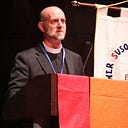You have posed an excellent question and I really appreciate this.
I've been talking about this type of idea for some time as well. What I have seen in Western Christianity is a divide between orthodoxy and orthopraxy. That's putting it in simple terms. Orthodoxy is primarily concerned with "correct" belief, while orthopraxy is primarily concerned with "correct" practice. The reality is that it's helpful to have a mix of both - one to offset the other so as not to go into fundamentalist belief systems of either/or thinking. Fundamentalism leads to othering since it is focused on "correct" belief as the most important thing. When we slip into this, then what we adopt is an ends justify the means approach to the world, which gives legitimacy to othering people. It's really hard not to other people in systems that are most concerned with orthodox thinking and belief because the primary concern is not about people, but thoughts and beliefs. The consequences of those thoughts and beliefs take on a distant second.
The core of your question is this - which is more important in your religion: your beliefs about people or people themselves? In Christian terminology, the question is which is more important, infallibility or seeing the Image of God in others? Or put another way - making sure people are correct in belief or seeking shalom which is invitational and is oriented towards moving in the direction of peace, wholeness, enoughness.
We see this same debate playing out in politics here in the US right now, often tied to religious belief. It centers around how one defines freedom. Is freedom about my ability to impose on others so they get it right (whatever that might pertain to), or is freedom about voluntary participation and rejection of being imposed upon?
Thank you again for this article. I really love the question you posed.
